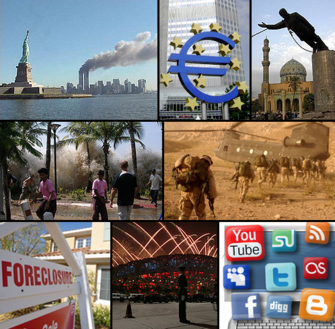Portal:2000s
Portal maintenance status: (June 2024)
|
The Portal:2000s Portal The 2000s (pronounced "two-thousands") was a decade that began on January 1, 2000, and ended on December 31, 2009. The early part of the decade saw the long predicted breakthrough of economic giants in Asia, like India and China, which had double-digit growth during nearly the whole decade. It is also benefited from an economic boom, which saw the two most populous countries becoming an increasingly dominant economic force. The rapid catching-up of emerging economies with developed countries sparked some protectionist tensions during the period and was partly responsible for an increase in energy and food prices at the end of the decade. The economic developments in the latter third of the decade were dominated by a worldwide economic downturn, which started with the crisis in housing and credit in the United States in late 2007 and led to the bankruptcy of major banks and other financial institutions. The outbreak of this global financial crisis sparked a global recession, beginning in the United States and affecting most of the industrialized world. The decade saw the rise of the Internet, which grew from covering 6.7% to 25.7% of the world population. This contributed to globalization during the decade, which allowed faster communication among people around the world;[1][2][3][4][5] The war on terror and War in Afghanistan began after the September 11 attacks in 2001. The International Criminal Court was formed in 2002. In 2003, a United States-led coalition invaded Iraq, and the Iraq War led to the end of Saddam Hussein's rule as Iraqi President and the Ba'ath Party in Iraq. Al-Qaeda and affiliated Islamist militant groups performed terrorist acts throughout the decade. The Second Congo War, the deadliest conflict since World War II, ended in July 2003. Further wars that ended included the Algerian Civil War, the Angolan Civil War, the Sierra Leone Civil War, the Second Liberian Civil War, the Nepalese Civil War, and the Sri Lankan Civil War. Wars that began included the conflict in the Niger Delta, the Houthi insurgency in Yemen, and the Mexican drug war. Selected article -On December 26, 2006, Gerald Ford, the 38th president of the United States, died at his home in Rancho Mirage, California at 6:45 p.m. local time (02:45, December 27, UTC). At 8:49 p.m. local time, his wife of 58 years, Betty Ford, issued a statement announcing his death. The causes of death listed on the death certificate were arteriosclerotic cerebrovascular disease and diffuse arteriosclerosis. At the age of 93 years and 165 days, Ford was the longest-lived U.S. president in history until George H. W. Bush lived to 94 years, and Jimmy Carter even longer. (Full article...) Did you know (auto-generated) -Lua error in Module:Selected_recent_additions at line 69: bad argument #1 to 'gmatch' (string expected, got nil). List articlesSelected biography -Richard Bruce Cheney (/ˈtʃeɪni/ CHAY-nee; born January 30, 1941) is an American retired politician and businessman who served as the 46th vice president of the United States from 2001 to 2009 under President George W. Bush. He has been called the most powerful vice president in American history. Cheney previously served as White House Chief of Staff for President Gerald Ford, the U.S. representative for Wyoming's at-large congressional district from 1979 to 1989, and as the 17th United States secretary of defense in the administration of President George H. W. Bush. He is the oldest living former U.S. vice president, following the death of Walter Mondale in 2021. Born in Lincoln, Nebraska, Cheney grew up there and in Casper, Wyoming. He attended Yale University before earning a Bachelor of Arts and Master of Arts in political science from the University of Wyoming. He began his political career as an intern for Congressman William A. Steiger, eventually working his way into the White House during the Nixon and Ford administrations. He served as White House chief of staff from 1975 to 1977. In 1978, he was elected to the U.S. House of Representatives, and represented Wyoming's at-large congressional district from 1979 to 1989, briefly serving as House minority whip in 1989. He was appointed Secretary of Defense during the presidency of George H. W. Bush, and held the position for most of Bush's term from 1989 to 1993. As secretary, he oversaw Operation Just Cause in 1989 and Operation Desert Storm in 1991. While out of office during the Clinton administration, he was the chairman and CEO of Halliburton from 1995 to 2000. (Full article...) General images -The following are images from various 2000s-related articles on Wikipedia.
TopicsRelated portalsLua error in mw.title.lua at line 346: bad argument #2 to 'title.new' (unrecognized namespace name 'Portal'). Categories<categorytree>Portal:2000s</categorytree> Wikiprojects
Associated WikimediaThe following Wikimedia Foundation sister projects provide more on this subject:
Sources
Discover Wikipedia using portals |
























